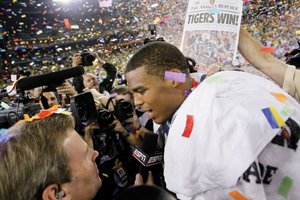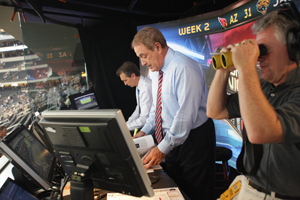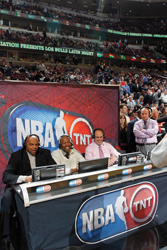Would you rather have more money or more TV viewers?
That was the choice the BCS faced in 2008 when it considered moving the national championship game — one of the crown jewels of American sport — from broadcast to cable.
The choice for ACC Commissioner John Swofford, the BCS coordinator at the time, and the other conference commissioners wound up being an easy one. They took the money.
At the time, ESPN told IMG's Barry Frank, who negotiated the deal for the BCS, that it would pay $495 million over four years to bring the national championship and other BCS games over to cable. That bid was $100 million higher than Fox's and was too big of a difference for the BCS to pass up.
 |
GETTY IMAGES
Conference commissioners couldn't resist ESPN's offer for BCS rights, even after predicting a 10 percent drop in viewership. |
"We had originally had a differential of a little more than $50 million, and I knew that wasn't going to make it," Frank said. "For $100 million, I think it was worth it. They would not have moved from Fox if the difference was $50 million."'
There's been a clear trend over the past decade of sports migrating to cable channels. Cable is home to MLB and NBA playoff series. Versus has carried two Stanley Cup Final games per year since 2006. The only place you could see NASCAR's Chase for the Sprint Cup last year was on ESPN.
But those deals come at a cost. Network and league executives say that cable channels still have to pay a healthy premium if they want to pick up the rights to bigger sports events. Leagues have not yet placed as much value on the broadband services and added shoulder programming that come with cable networks, as they do on the broadcast universe of 114 million homes.
Television viewership trends on broadcast and cable networks |
NFL prime-time average viewership* |
|
|
|
2010 |
21,800 |
14,657 |
2009 |
19,418 |
14,382 |
2008 |
16,638 |
11,962 |
2007 |
15,964 |
11,230 |
2006 |
17,504 |
12,325 |
MLB league championship series average viewership |
|
|
|
2010 |
TBS |
8,223 |
2009 |
Fox |
10,306 |
2008 |
TBS |
7,443 |
|
|
|
2010 |
Fox |
9,053 |
2009 |
TBS |
6,064 |
2008 |
Fox |
7,389 |
NASCAR Chase for the Sprint Cup average viewership |
|
|
|
2010 |
ABC/ESPN |
4,494 |
2009 |
ABC |
5,489 |
BCS average viewership |
|
|
|
2011 |
ESPN |
16,729 |
2010 |
Fox/ABC |
19,278 |
2009 |
Fox/ABC |
17,595 |
2008 |
Fox/ABC |
15,554 |
2007 |
Fox/ABC |
18,123 |
Stanley Cup Final average viewership |
|
|
|
2010 |
3,369 |
6,120 |
2009 |
3,211 |
5,597 |
2008 |
2,480 |
5,408 |
2007 |
650 |
2,434 |
2006 |
863 |
3,576 |
* Does to include NFL Network's partial-seasonschedule.
Source: The Nielsen Co. |
For the BCS, an expected 10 percent viewership decrease was worth about $25 million per year.
The Auburn-Oregon national championship in January drew 27.316 million viewers, an 11 percent drop from last year's Alabama-Texas game, which drew 30.776 million viewers to ABC. That number is good enough to place fourth out of the last 12 BCS national championship games and was the most-watched cable program of all time. Overall, for all of the BCS games, the first year of the series on ESPN dropped an average of 2.549 million viewers from 2010 (down 13 percent), when the games were shown on Fox and ABC.
"It's what we expected when we made the decision to go in that direction," Swofford said. "It took some thorough and lengthy discussions about the wisdom of doing it or not. The financials pushed it in that direction, but we would not have taken that step unless we felt the vast majority of sports fans could have access to it if they really wanted it."
A premium on viewers
It's undeniable that cable brings a smaller audience than broadcast networks — most put the sports viewing differential at 10 percent between broadcast and cable. The biggest cable channels, such as ESPN, TNT and TBS, are in 100 million homes, compared with broadcast's reach of 114 million homes. By almost any comparable measure, the sports TV audience on broadcast is bigger, which is why cable channels still have to pay a premium over broadcast for the same content.
NBC's "Sunday Night Football" has averaged more viewers than ESPN's "Monday Night Football" every year since those packages were split in 2006 (see chart, Page 18). Fox averages more viewers than TBS during MLB's league championship series. The Stanley Cup audience on Versus is a fraction of what NBC delivers. And NASCAR ratings dropped significantly last year for races that moved from ABC to ESPN.
The quiet competition between broadcast networks and their cable counterparts is one of the most debated components in sports media. Broadcast networks believe ESPN and Turner don't get the scrutiny they should, and they have spent years complaining about ESPN's dual revenue stream of cable affiliate fees and ad sales, which allows cable channels to pay more for rights. But many rights holders and sports media consultants insist that cable channels will continue to have to pay a premium to bring bigger sports events onto cable television.
"Broadcast TV has a rating premium, a prestige premium, and a production premium in the minds of many rights-holders," said Frank, IMG's executive vice president of media sports programming. "That broadcast premium is shrinking, but it's shrinking very slowly."
While this competition is well-known in media circles, the NFL offers a perfect and public example of this kind of premium. ESPN pays an average of $1.1 billion per year for "Monday Night Football." That's around 82 percent higher than the $603 million annual average NBC pays for "Sunday Night Football."
Yet there are elements of NBC's deal that you would expect would go to the channel paying a bigger rights fee. The broadcast network has rights to one wild-card playoff game; ESPN doesn't. NBC is in the rotation to broadcast the Super Bowl every three years; ESPN isn't. Plus, NBC typically gets a better package of games for its prime-time Sunday night schedule than ESPN.
 |
NBC PHOTO / ZADE ROSENTHAL
NBC pays substantially less for "Sunday Night Football" than ESPN pays for "Monday Night Football," and gets many more benefits in its deal.
|
ESPN is negotiating to extend its deal with the NFL, agreeing to pay between $1.8 billion and $1.9 billion a year to keep "Monday Night Football." Yet despite agreeing to pay nearly $2 billion a year on average for "Monday Night Football" rights, ESPN still will not be in the rotation to telecast the Super Bowl, though sources say it's likely that ESPN eventually will gain a wild-card game.
"We are focused on providing broad distribution for NFL games," an NFL spokesman said. "Given our large fan base, broadcast television has been an outstanding partner and has helped us telecast NFL games to the widest possible audience."
Despite the cable premium, cable channels increasingly have been enticing sports events with a bigger checkbook and more services. Cable channels generally have more expansive digital and mobile services than broadcast networks, which allows them to reach more fans who are not in front of their televisions. The bigger leagues view those added services as nice to have, but they still want to be paid for TV numbers.
"You'd like to think in this day and age that relationships matter," said Fox Sports Co-President Eric Shanks. "But in the end, the check always rules."
Turner is about to start telecasting NCAA tournament games, to go along with one MLB league championship series per year, and the NBA playoffs. ESPN just finished its first season with the BCS, to go along with NASCAR's Chase, the British Open and the NBA playoffs.
"There are three properties on broadcast that probably will stay on broadcast for the near term — call it three or four years," said John Skipper, ESPN's executive vice president of content, referring to the NFL playoffs, World Series and NBA Finals. "Only the NFL has made much of a public deal out of saying that they continue to believe that their championship has to be on free, over-the-air television."
Skipper said rights holders often start negotiations by telling him that they want a broadcast window, which in ESPN's case means ABC. But, he adds, broadcast demands rarely present a significant hurdle in negotiations.
"It comes up because people have a reflexive reaction to ask about network. In almost no discussions is it a significant problem anymore," Skipper said. "We're pretty clear with people that in most of our negotiations, we're talking with them about ESPN. I have yet to be thrown out of the room."
BCS lessons
The drop in the number of viewers for the BCS national championship game bolstered broadcaster complaints that cable networks don't grow a property's audience and won't attract casual fans.
 |
NBAE / GETTY IMAGES
Sports rights give channels leverage when negotiating carriage fees with cable systems. |
"My competitors still run around and say, 'Network builds product up; ESPN tears them down,'" ESPN's Skipper said. "It's just not true. No sport has had a problem being relevant to an audience, having a wide audience because of being on ESPN."
ESPN executives say the overall TV numbers don't tell the whole story.
Cable networks skew younger, they say, which is important to advertisers who help support the programming. This year's BCS championship, for example, actually saw a jump in the male 18- to 34-year-old demographic from last year. That's the demo that advertisers covet.
ESPN executives also are quick to point out that half of the 2.9 million broadcast-only viewers who tuned in to the 2010 BCS championship game on ABC watched only 11 minutes of the game.
"These are casual bystanders," said Artie Bulgrin, ESPN's senior vice president of research and analytics. "That's not what's driving the audience."
ESPN and BCS executives say it's foolish to focus only on TV numbers for the game's three-hour commitment. Throughout the season, ESPN ran BCS-related programming, building up to the championship. Swofford said the BCS was attracted to ESPN's commitment to run BCS programming all season across its networks and websites.
"There's a feeling if cable is the entity that can give the best all-around coverage leading into the game, after the game and the event itself, then it's probably the way to go," Swofford said.
Turnkey Sports Poll
The following are results of the Turnkey Sports Poll taken in January. The survey covered more than 1,100 senior-level sports industry executives spanning professional and college sports. |
» If you were a sports property reviewing options for your next rights deal, what would you choose? |
Lower rights fee from a
broadcast network, but
access to more households |
46% |
Higher rights fee from a cable
network, but access to fewer
households |
45% |
Not sure / No response |
9% |
» Which of the following cable sports TV networks is most poised for a breakout year? |
Versus |
37% |
Big Ten Network |
23% |
Fox Soccer Channel |
11% |
Golf Channel |
5% |
Speed |
4% |
The Mtn. |
2% |
Tennis Channel |
1% |
Not sure / No response |
17% |
» On which of the following devices have you ever watched a live sporting event? (Please select all that apply) |
Computer |
77% |
Smartphone |
26% |
Tablet computer (iPad, etc.) |
21% |
3-D television |
11% |
None of these |
19% |
Source: Turnkey Sports & Entertainment in conjunction with SportsBusiness Journal. Turnkey Intelligence specializes in research, measurement and lead generation for brands and properties. Visit www.turnkeyse.com. |
Skipper pointed to ESPN studio shows, such as "College GameDay" and "College Football Live," as well as its live game windows on ABC, ESPN, ESPN2, ESPNU and ESPN3 as evidence that ESPN covers college football more thoroughly than other media outlets.
"I think it was a fairly beautiful thing that from the first week of the season with the kickoff weekend down in Atlanta, to the championship in Phoenix, the place where you found the most continuity in college football was ESPN," Skipper said. "We think ESPN is the right place to put the BCS championship."
Swofford agrees, but he said he picked up the most validation last year when the NCAA tournament cut a deal to put the Final Four and championship game on Turner starting in 2016.
"We were taking a step particularly in terms of mainstream sports and the ultimate championship game that had not been taken," Swofford said. "We certainly were in the early phase of it."
The NCAA tournament
Turner felt the same cable premium as it negotiated a 14-year, $10.8 billion deal to share the NCAA tournament with CBS. Because Turner can increase its affiliate fee across three networks (TNT, TBS and truTV), it is paying a bigger share of the rights fee, industry sources said. CBS also capped the amount of losses it could incur.
But in exchange, Turner's president of sales, distribution and sports, David Levy, made sure that Turner would have a package that was equal to CBS's. "I made it clear from our very first meeting that I was not interested in any sort of smaller cable package," Levy said. "We are sharing this."
CBS, which couldn't afford to keep the tournament on its own, agreed to the deal, which will see Turner carry the Final Four and championship game every other year, starting in 2016.
"It was a question of economics," said Sean McManus, chairman of CBS Sports. "The amount of money that both we and Turner are paying for the television rights necessitated that we both got rights to the Final Four in certain years. We wouldn't have paid the kind of money we are paying, and Turner wouldn't have paid the kind of money they are paying, without the opportunity to showcase the Final Four and the championship game."
The advantage Turner brings is that it has the outlets to show all of the tournament's games — an upgrade from CBS's regionalized coverage over the past couple of years.
"Cable has always been a great opportunity to grow the overall revenue pool in sports," Levy said. "Cable gives all sports leagues the opportunity to run on different nights."
That sort of flexibility convinced MLB to sell alternating league championship series to Turner.
"Our cable partner has more flexibility because they have more outlets than a single broadcast station," said Tim Brosnan, MLB's executive vice president of business. "That's the benefit of the big cable guys. They have scheduling flexibility that they can loan to you by virtue of usually having more than one outlet available to them. Because of the way they program, they are a little less intense about prime time in the fourth quarter."
Cable cash
Last month, when Comcast's NBC acquisition finally closed, NBC Sports Chairman Dick Ebersol sent an internal memo to his new employees that underscored why so many cable outlets are looking to acquire sports packages.
Ebersol's memo, which was obtained by SportsBusiness Journal, talked about the combination of broadcast and cable sports assets. But Ebersol gave a special shout-out to something he hasn't had at NBC: "sub fees that we broadcast dinosaurs have coveted for so long."
Those "sub fees" — the money distributors pay to carry cable channels — enable cable networks to afford sports rights better than broadcast networks, which mainly are dependent on only advertising revenue. It's why so many competitors for sports rights live in the cable world, like ESPN, Turner and Versus, with others, like FX, looking for opportunities. Those channels know that cable and satellite operators pay more for channels that offer sports than they do for channels that are focused on news or entertainment.
 |
GETTY IMAGES
Versus has carried two Stanley Cup Final games per year since 2006. |
ESPN makes more than $4 a subscriber a month. With 100 million pay-TV homes, that equals $4.8 billion a year, even before ad sales are factored in. Thanks largely to the NBA and MLB playoffs, TNT pulls in around $1 a subscriber a month. With the NCAA tournament spread across three Turner channels, Levy expects to get healthy increases from distributors that can't afford to lose NCAA tournament games in March.
But broadcasters are starting to make changes. Fox, in particular, has convinced distributors to pay cash for retransmission consent rights. Fox believes that the additional source of revenue will help it better compete with cable networks for sports rights.
"We look at the broadcast business as a business that should have and will have two revenue streams and should be able to compete on any level with any rights negotiation over time," said Fox Sports Co-President Randy Freer. "It doesn't happen overnight. But we certainly believe that it's a model that can be converted to a dual-revenue-stream model."
Taking care of the distributors who pay that revenue stream is one reason why Skipper wants to move so many sports over to ESPN.
"Our job is to serve fans," he said. "Our job as a division of Walt Disney Co. is to return the greatest profits to our shareholders. Clearly, we're making decisions to put content on ESPN because we believe it will drive value to our distributors. They pay us a significant amount of money, and we have an obligation to drive value to them. That ultimately drives our profits and helps pay the shareholders of Walt Disney Co. That's the enterprise we're engaged in here."
Staff writer Michael Smith contributed to this report.







